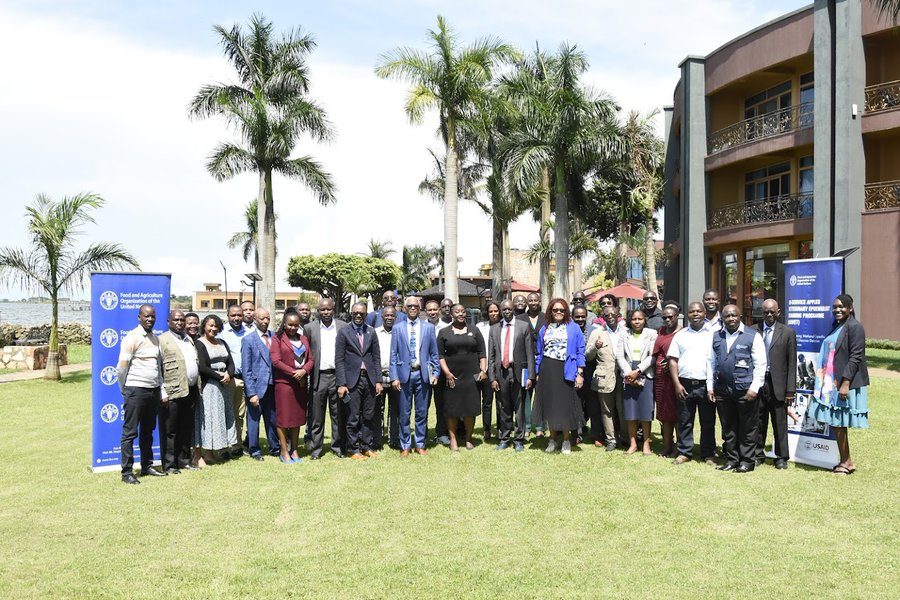ENTEBBE, May 14, 2024 – The Food and Agriculture Organisation of the United Nations [FAO] recently hosted an In-Service Applied Veterinary Epidemiology Training [ ISAVET ] Programme Regional Workshop.
The three-day event was attended by representatives from 10 countries from Eastern and Southern Africa, including Ethiopia, Kenya, Madagascar, Malawi, Mozambique, Rwanda, South Sudan, Tanzania, Uganda, and Zambia.
The workshop, aimed at fostering collaboration and sharing best practices, addressed crucial aspects of ISAVET implementation, successes, and strategies for sustainability.
According to the organisers, the objectives of the workshop were to facilitate the exchange of experiences among countries implementing the Global Health Security Project [GHSP], identify sustainable approaches for nationally owned ISAVET programmes, and enhance the operationalisation of One Health principles at both national and community levels.
The GHSP is a collaborative partnership project between the FAO and the United States Agency for International Development [USAID]. The project seeks to improve the capacity of the animal health sector to prevent, detect and respond to public health threats and contribution to national and global health security.
During the workshop, representatives from organisations involved in the ISAVET programme shared their perspectives on the significance of the event and the broader impact of veterinary epidemiology training in the region.
Assumputa Bibaze, the Programme Management Assistant at Global Health Security Unit – USAID lauded FAO for the partnership aimed at enhancing animal health sectors across supported countries.
He said: “At USAID, we are deeply committed to strengthening the One Health strategy and FAO’s invaluable support plays a pivotal role in realising this vision. Through ISAVET, we commend the Government of Uganda for empowering limited human resources, and with over 100 trainees, we have witnessed inspiring success stories in the field that FAO continues to champion.”
On his part, Dr. Antonio Querido, FAO Representative for Uganda, emphasised the crucial role veterinarians play in safeguarding public health.
He noted that Veterinarians play a critical role in preventing the spread of zoonotic diseases [diseases that cross from humans to animals and vice versa], and ensuring safe agrifood systems.
“I have witnessed a lot of progress in One Health institutionalisation and extension to reach wider publics, including the grassroots and those marginalised. It cannot be taken for granted that over 5000 animal health personnel in Uganda have been given specialised skills to handle zoonotic diseases in the last 5 years, supported by FAO and other partners,” he said.
Querido also reaffirmed FAO’s commitment to strengthen Uganda’s resilience against threats and crises. He urged other stakeholders to join efforts in increasing the number of frontline workers in the veterinary sector to ensure sustainability.
Dr. Peter Wanyama, Assistant Commissioner at the National Animal Disease Diagnostic and Epidemiology Centre [NADDEC] in the Ministry of Agriculture, Animal Industry and Fisheries [MAAIF], called for an integrated programme to address challenges such as inadequate public veterinary personnel, low disease detection and response rates, and underutilization of livestock data.
He noted, “As Uganda, we have greatly benefitted from this initiative. With five cohorts trained in Uganda, our reporting capacity has improved, enabling us to respond effectively to diseases. I thank all the development partners who have enabled us to achieve this.”
Meanwhile, Dr. Sam Okuthe, the Regional Epidemiology Training Coordinator for Eastern and Southern Africa, ISAVET programme noted that ISAVET trains frontline workers in detecting and responding to zoonotic diseases and transboundary animal diseases.
“In 10 countries, including Uganda, ISAVET has trained 494 frontline workers, 278 trainers, and 278 mentors, with costs varying per country. Success stories include improved disease surveillance and outbreak investigations, enhancing the One Health approach through multisectoral coordination,” he added.
Buy your copy of thecooperator magazine from one of our country-wide vending points or an e-copy on emag.thecooperator.news
